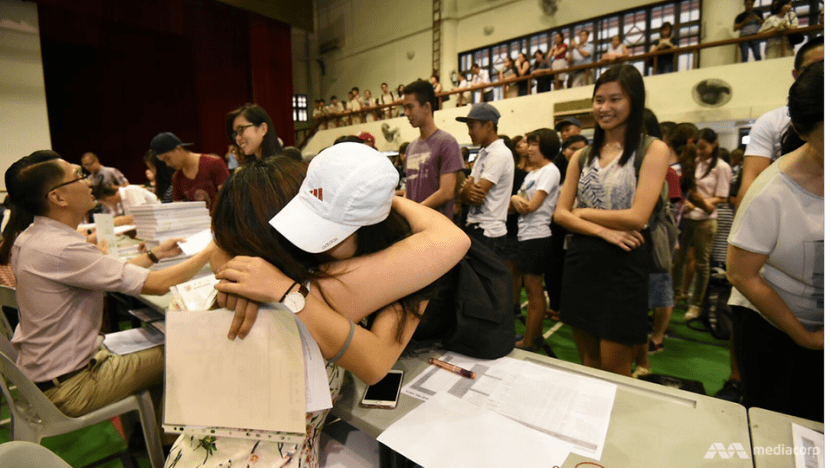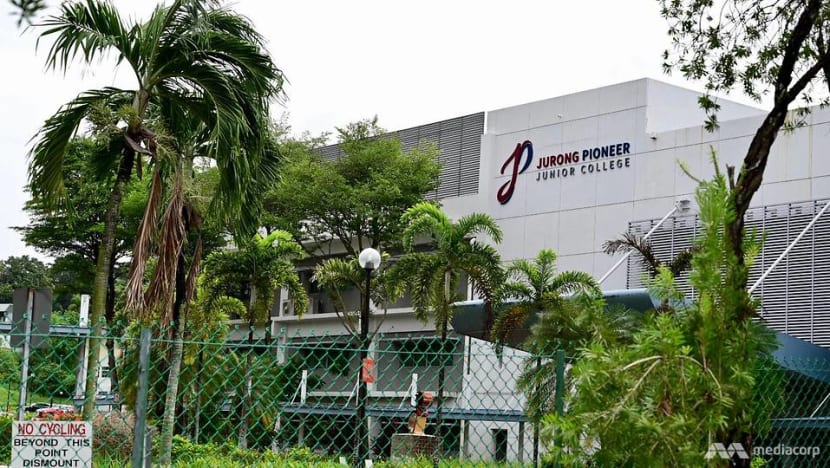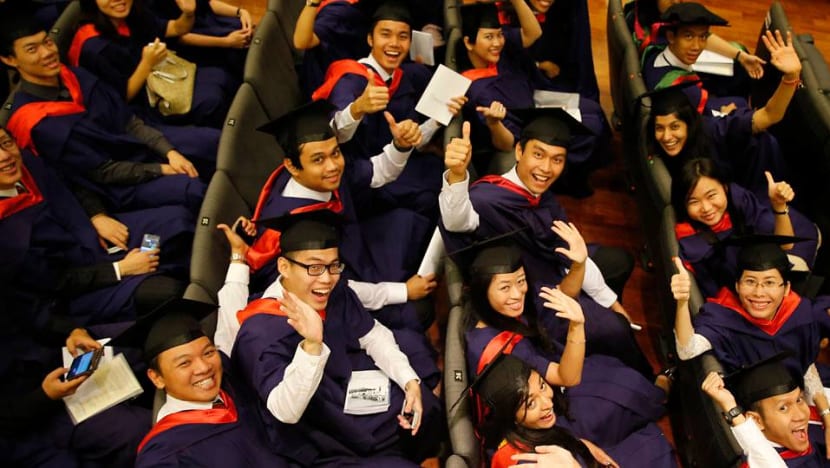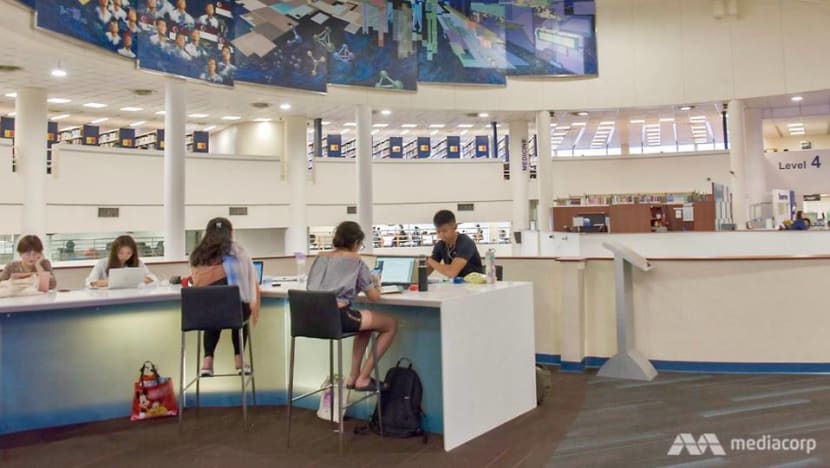commentary Commentary
Commentary: Forget uni for now. After the A-Levels, get work experience first
An internship or traineeship can give you invaluable knowledge about dealing with business transformation and disruption — a crucial skill for a post-COVID world.

File photo of students receiving their A-Level results.
SINGAPORE: One of the best decisions I made for my education was to take a break from it.
After three years in a polytechnic pursuing the grades I’d need to enter a local university, ironically I wasn’t sure what I wanted to study in university. So I informed my parents I would take a gap year.
They were concerned that waiting an extra, needless, year to apply for university would mean I’d face greater competition, not least since places were already limited for polytechnic students.
But I held my ground: A gap year was essential to me. I needed to unwind from the last three years of intense pressure and figure out what I really wanted to do outside of other people’s expectations of me.
I chose not to travel, like many would expect to do in their gap year, and instead worked in the corporate communications office of my polytechnic. It was a familiar environment, allowing me to take things slow and reflect on my immediate future, while easing into corporate life.
What I didn’t expect was that single year would continue to pay off in spades a decade later - not only would it sharpen my skills during my formative years but it gave me the confidence required to take leaps of faith.
TAKING A GAP YEAR IN A PANDEMIC
When the A-Level results are released today, many choices will be made. Most will revolve around what to study in university and where to apply.
Far fewer people, however, may think about whether to even apply for university now — especially if they have good grades that could easily land them in a reputable institution and in-demand course and “secure” their future for the next few years.
READ: Commentary: How I picked up the pieces after failing my A-Level exams
I might not have sat for the A-Levels, but I understand the concerns around taking a break before going to university.
Unlike their polytechnic peers, junior college (JC) students don’t have the luxury of falling back onto their diploma which would have given them suitable practical skills to survive in the working world, if they were unable to get into university.
And with the perennial uncertainty of life under the pandemic now, the stability that a university degree promises to provide can be harder to refuse.

However, taking a gap year to do an internship or traineeship should be a serious option for those receiving their A-Level results, especially during this pandemic.
LEARNING ABOUT BUSINESS TRANSFORMATION
Let’s face it - we are never returning to life before the pandemic.
The COVID-19 pandemic has likely permanently disrupted many industries, forcing businesses to intrinsically transform themselves in order to adapt.
For instance, small food businesses have to beef up their delivery strategies, night clubs have turned into indoor cycling studios, and many corporations have enforced hybrid working schedules, compelling a collective reimagining of work-life balance in the new normal.
READ: Commentary: Action and caution needed, as business schools respond to disruption
Old ways of building a career are no longer relevant. Your dream career has been reshaped by the pandemic — and this is the perfect opportunity to get firsthand experience about its change.
Not only will this indispensable knowledge give you a leg up from your peers when you apply for jobs in the future, it will also make you more intentional and savvy about learning new skills and theories in university to complement your real-world experience.
In three or four years, your peers would be just beginning work in what would likely be a transformed economy and industry, getting their feet wet in the new normal.
By taking a gap year now and working, you, on the other hand, would be part of this transformation in the next year or two, putting you in a driving position to navigate the new landscape when you graduate.
For JC students who don’t get work experience as part of the JC curriculum, a self-sourced internship or traineeship before university shows your initiative and enhances your existing theoretical knowledge in relevant fields.
Job sites show the availability of many digital marketing, customer service and even human resource internships suitable for A-Level graduates as they don't require an applicant to have a degree or diploma.
Despite the present tight job market, there is still a sizable number of opportunities for A-Level graduates, with many open positions for students in recruitment agencies, educational providers and customer-service providers on job portals and LinkedIn.
Those looking for help to navigate these waters can also get support from dedicated resources and networks to help A-Level students get work experience.
Student resource portal BrightSparks has more than 500 postings of student vocations including in fields such as branding, digital marketing, wealth management and alumni engagement.
Even if you don’t end up working in these fields eventually, these jobs require a certain level of public engagement, honing your emotional intelligence.
Besides valuable work experience, some candidates can end up getting a solid brand name on their resume even before they start university, which will help you stand out later in your career.
Among the employers hiring A-Level graduates include Enterprise Singapore, SAP and Shopee.
Moreover, if you can afford to take on volunteer opportunities during your gap year, they tend to impart useful values, such as moral engagement and caring for the community.
The National Youth Council runs the Youth Corps Singapore programme while non-profit organisations like Conjunct Consulting can help you meet your volunteering aspirations too.
READ: Commentary: Here's what will help students stand out in a competitive job market
Taking an internship or traineeship now gives you the opportunity to learn about the career you want and how the pandemic has changed its course, so that you can better appreciate the value and relevance of what you eventually study in university.
It's not just me. Higher-education leaders in Singapore too advocate the importance of such a gap year.
Speaking on how universities are being refreshed with the inclusion of internships, service-based learning and more activities outside of lectures in early February, Education Minister Lawrence Wong talked about the importance of such interdisciplinary activities for a holistic education.
WHAT CAN’T BE TAUGHT IN SCHOOL
Pandemic aside, the traditional mindset that taking a gap year is for the lazy and unmotivated doesn’t quite hold anymore either.

A gap year has become an almost crucial detour to pick up skills that you couldn’t have learnt in the classroom.
This aligns with society’s concerted effort to become less results-oriented, from plans to abolish the secondary school streaming system in 2024 to getting more employers to look beyond paper credentials.
For one, my gap year exposed me to various sorts of characters in the workplace. I worked with supervisors who were laid back as well as those who were more exacting in their demands, giving me applicable EQ skills I couldn’t simply have learnt from a business etiquette module.
Workplace projects also carried a different gravity than school projects, reinforcing the importance of accountability.
Not to belittle the need to get a good grade for coursework in university, but the responsibilities at work often have the fortunes of others, and the organisation’s, tied to them.
READ: Commentary: New habits, strategies and skills needed as global economy sands shift
But it’s not just the practical lessons or skills that stay with you.
Taking a gap year fundamentally changed my perspective on paper qualifications.
My grades, as much as they may have made my job application stand out, were irrelevant to the job. No one cared that I once scored straight A’s in a semester, only whether I was able to copy-edit a 100-page report within the day.
So, my gap year made me rethink how I wanted to experience university.

The first step was making conscious decisions to place less priority on academic achievements in university, as wildly uncomfortable as that made me feel.
I filled my summer holidays with an unpaid internship and took on a part-time job in retail during my school semesters.
I signed up for modules I wanted to learn from, even if they were reputed to be unnecessarily challenging. I chose to boost my freelance writing portfolio in my spare time rather than do my readings or cram for tests and examinations.
READ: Commentary: What the uncertainty after receiving A-Level results can teach you about adulting
PREPARING FOR THE CURRENT CHALLENGES
I often questioned whether my decision would result in me being unable to enter a local university, and whether a single year would really make an impact on my career in the grand scheme of things.

I got the answer to the first question a year later: I did get into a local university. The answer to the second question, however, only made itself clear during this pandemic.
My gap year wasn’t the ultimate solution to escaping a stressful education system, nor did it magically enable me with skills that would open all doors for me.
But that single year kickstarted a vital realisation that there was more to life than blindly pursuing what I’d been taught to want. It made me more comfortable with uncertainty, and with charting my own path in life even - or perhaps, especially - when it was an unpopular choice.
When I took a break before university to gain work experience, I promised my parents I would just take one year. My only regret is that it wasn’t longer.
Listen to three working adults reveal how their PSLE results have shaped their life journeys in a no-holds barred conversation on our Heart of the Matter podcast:
Grace Yeoh is a senior journalist with CNA Insider.












